Pamela King Cable's Blog, page 3
May 16, 2013
No More Charlatans!

Slimy TV preachers (both men and women) who beg for
money and then buy jets and gold toilets and subsidize their large families
with six-figure incomes and estates … there’s no one to blame but their
followers. Are folks really not aware of the oppulent lifestyles of the rich and religious? It boggles my mind when I see them on TV in huge arenas filled to
capacity.
Charlatans! And it's not just southern preachers. These megachurches exist in every state!
Are you giving these people your hard-earned money?
Stop and think before you send in that tithe and love
offering. Does God really need my money? Or does He really intend to
test my faith on a regular basis by whether or not I give my last dime?
I swallowed that dogma for
years and chased the feelings of eternal security until my feet were worn to
bloody stubs.
Am I now an apostate? Have I forsaken the cross?
No.
I learned that we cannot
control God by "giving until it hurts." I've had it with
folks praising God on camera and living like the devil when the house lights
are turned off.
I've heard a TV preacher even go so far as to say … “Nobody living high
on the hog around here!” Oh yeah? Hmmm. If a member of the congregation asked
to review their books, would they open them freely? What about the jet parked
at the airport? What about the millions spent on “mission” trips? Who benefits,
really? Any idea how much that costs? Does a church really need millions every
year to keep the electric on? The questions here are endless …
I guess another question is, who wins more souls? The little
church with the white steeple down the street, or the gigantic church that
covers several city blocks? The big, blustery televangelist or the quiet
country preacher? Is one better than the other?

Seems to me we need to take a lesson from the new pope.
Jorge Mario Bergoglio became Pope Francis this year. Humble, the man cooks for
himself, lives in a small apartment, and rides the city bus. It is said he has
reigned-in the spending at the Vatican.
The following statement has explained away the sickening
excess of some Pentecostal/charismatic ministries. I’ve heard it said numerous
times. “God wants His people to have the best.” Um, no. Not at the expense of those
who struggle to put food on the table. This could also be said another way.
“God wants His Pastors to have the best.” That’s the way many evangelical
churches have been run for the past few decades, and it’s time we said… ENOUGH.
Pastors have hopped on the Prosperity Message bandwagon over
the years when they saw how much it added to their competitor’s bottom lines.
But it’s way out of control. The guilt and shame they hold over your head, as if they're God with a big stick, it
has to stop.

J. Lee Grady, who wrote Fire in My Bones in the May
2013 Charisma magazine said, “God opposes pride. Pompous religious display,
ego-driven greed and Pentecostal popemobiles have no place in a Spirit-filled
movement …”
He's right.
I think that’s the majority of televangelists these days.
No more bodyguards!
No more $10,000-per-night hotel rooms!
No more private jets!
No more Charlatans!
Published on May 16, 2013 14:46
May 14, 2013
The Middle Of The Book

Back in the ‘sixties when
geezers over fifty drove DeSotos and watched Lawrence Welk and kids under twenty
drove Volkswagen vans and painted peace signs on their faces and me and my
sisters were the only ones on our block who wore bobby socks and saddle shoes,
this girl moved two doors down with poker-straight hair and Bob Dylan records
and no mother.
Well. Talk about your run-on sentence.
First sentences of any novel should do that. They should pin
you to the wall and hold you like super-glue. A first sentence is filled with
magic and pierces
your heart or peaks your interest to the point that before you know it, you're
five chapters in.
But what about the middle of the book? Doesn't it deserve the
same?
Lately, I'm finding I've spent as much time on the arc of the
story and the chapters following it as I have on that first sentence. Some
novels I've read lately have left me flat in the middle. As if the writer had a
great idea for the beginning and end, then just filled in the middle the best
they could. Sometimes with paragraphs and chapters that have very little to do
with the actual story. As a result, my eyes skim over a third of the middle just
to find out what happens at the end.
I think the middle of any story should be every bit as
thrilling as the beginning. It sometimes answers questions, agreed. Maybe even
ties up a few loose ends. But a skilled writer knows how to up the ante, raise
the stakes, and turn the tide in the middle pages in ways the reader never sees
coming. A good writer can introduce a new character (another rule breaker) or
change point of view all while keeping the tone and voice throughout. Keep me
enthralled through page 200 and I'll be your biggest fan.
The middle should set up the ending without giving it away.
But it's often the most overlooked. It is also where readers find giant pauses.
A place they can stuff in their bookmark and put down the book. The question is,
are they anxious to get back to it or do they hesitate to pick it back up
again?
The middle of the story is where the heart is. Writers, by
all means, pay attention to it. Give it as much love as the rest.
Blessings to you and yours.
Published on May 14, 2013 07:14
May 10, 2013
Stainless Steel And Granite
I took some time off to regroup and spend precious moments with family. Now that I'm back to work, I'm finding myself overwhelmed with thoughts and ideas. The workload is heavy, but I'm slowly digging myself out. Getting organized is a process when leaving my desk for any length of time.
What has struck me funny the past couple of days is one, my blog is all over the place, and two ... I don't care. I blog when I can, when I have something to say, and I write only what's on my mind. Religion, current events, on writing, publishing, family matters, garage sales, or shopping for a new bra. I have no notion that folks follow me because I might have some awe-inspiring thing to say about writing or because I make them laugh with every blog. I don't. I know that. Blogging, for me, is a personal thing. My human emotions are up and down, and therefore ... so is my blog. It goes against all the current blogging rules, but again ... I've never been much for playing by the rules.
While I've been relaxing the past week or so, I've flipped on the TV a few times to watch my favorite HGTV shows. Once again, I'm astounded by the number of young couples buying homes with huge budgets. Couples who want (make the whining sound here) "granite" and "stainless steel." Couples who hate the color of the walls, the flooring, or that the two-car garage isn't "big enough." Michael and I shake our heads and laugh. Out loud.
Michael's first home was an apartment with no sink in the bathroom. They brushed their teeth in the kitchen. Their tiny black and white TV sat on a cardboard box covered with a tablecloth. Rabbit ears. Need I say more?
My first home was a single-wide on wheels. I didn't have a color TV until sometime in the 1980s. Flatscreen? Not on your life. No such thing. Cable wasn't even invented yet. But we did have the latest gold linolium and shag carpet. We never replaced carpet when we moved to a new place, we just scrubbed the hell out of the old stuff. Putting a roof over our heads and food on the table was priority number one. Having a decent car to drive and clothes on our backs was a struggle at times. In fact, I've never had granite. Or stainless steel. Or new furniture for that matter. Over my lifetime, I've purchased new mattresses, but that's it. My furniture has all been second hand from my mother or my sisters or friends. I've done plenty of garage sale shopping in my lifetime.
So when I hear someone whine that the open-concept living isn't "roomy enough," or that the floors are "laminate" and not "natural wood" ... I want to scream. And what's the deal with popcorn ceilings? I hate them, too, but for crying out loud. It's a roof over your head!
When did twenty-somethings start thinking they have to have the best of everything before their 30th birthday? When did "starter homes" become a thing of the past? Four bedrooms, three and a half baths? Are you kidding me? My son slept in the livingroom in his crib until we moved when he was two. As far as I know, he's not had any trauma from it.
I think about the house I grew up in, how we only had one bathroom with no shower. Only tub baths for us girls. Stainless steel appliances? Ha! My mother was happy when her oven worked. There was no dishwasher, except for me. Granite counter tops? White laminate with gold fleck. Oh, yeah.
What's wrong with a little struggle? Learning to appreciate even the small things in life, like an extra twenty bucks left over after the bills are paid, more than two pair of shoes, and eating out? What happened to us? Why are so wrapped up in labels and fancy cars? What's wrong with clothes from Kmart and keeping a car long enough to pay it off?
I'm wondering if I'm starting to sound like my grandmother and her "back in the Depression" speeches. Still, I think we're spoiled. We've had it too good, and technology has changed us.
Look, there's nothing wrong with having it all. It's how you get it that matters the most .
I look back at the single-wide I lived in. It was nothing fancy, but it was clean and I was proud to pay that $100 a month rent. Those avocado-green kitchen appliances are long gone. It's been over 30 years since then. The road from there to here has been full of pot-holes and empty promises. I may not see my mansion until I walk through the Pearly Gates. Until then, I'm happy with my old farmhouse, my 2006 Honda, and shopping for bargains at Kohls. If there's one thing I've learned in my lifetime, happiness can't be found in stainless steel and granite.

Blessings to you and yours.
What has struck me funny the past couple of days is one, my blog is all over the place, and two ... I don't care. I blog when I can, when I have something to say, and I write only what's on my mind. Religion, current events, on writing, publishing, family matters, garage sales, or shopping for a new bra. I have no notion that folks follow me because I might have some awe-inspiring thing to say about writing or because I make them laugh with every blog. I don't. I know that. Blogging, for me, is a personal thing. My human emotions are up and down, and therefore ... so is my blog. It goes against all the current blogging rules, but again ... I've never been much for playing by the rules.
While I've been relaxing the past week or so, I've flipped on the TV a few times to watch my favorite HGTV shows. Once again, I'm astounded by the number of young couples buying homes with huge budgets. Couples who want (make the whining sound here) "granite" and "stainless steel." Couples who hate the color of the walls, the flooring, or that the two-car garage isn't "big enough." Michael and I shake our heads and laugh. Out loud.
Michael's first home was an apartment with no sink in the bathroom. They brushed their teeth in the kitchen. Their tiny black and white TV sat on a cardboard box covered with a tablecloth. Rabbit ears. Need I say more?
My first home was a single-wide on wheels. I didn't have a color TV until sometime in the 1980s. Flatscreen? Not on your life. No such thing. Cable wasn't even invented yet. But we did have the latest gold linolium and shag carpet. We never replaced carpet when we moved to a new place, we just scrubbed the hell out of the old stuff. Putting a roof over our heads and food on the table was priority number one. Having a decent car to drive and clothes on our backs was a struggle at times. In fact, I've never had granite. Or stainless steel. Or new furniture for that matter. Over my lifetime, I've purchased new mattresses, but that's it. My furniture has all been second hand from my mother or my sisters or friends. I've done plenty of garage sale shopping in my lifetime.
So when I hear someone whine that the open-concept living isn't "roomy enough," or that the floors are "laminate" and not "natural wood" ... I want to scream. And what's the deal with popcorn ceilings? I hate them, too, but for crying out loud. It's a roof over your head!
When did twenty-somethings start thinking they have to have the best of everything before their 30th birthday? When did "starter homes" become a thing of the past? Four bedrooms, three and a half baths? Are you kidding me? My son slept in the livingroom in his crib until we moved when he was two. As far as I know, he's not had any trauma from it.
I think about the house I grew up in, how we only had one bathroom with no shower. Only tub baths for us girls. Stainless steel appliances? Ha! My mother was happy when her oven worked. There was no dishwasher, except for me. Granite counter tops? White laminate with gold fleck. Oh, yeah.
What's wrong with a little struggle? Learning to appreciate even the small things in life, like an extra twenty bucks left over after the bills are paid, more than two pair of shoes, and eating out? What happened to us? Why are so wrapped up in labels and fancy cars? What's wrong with clothes from Kmart and keeping a car long enough to pay it off?
I'm wondering if I'm starting to sound like my grandmother and her "back in the Depression" speeches. Still, I think we're spoiled. We've had it too good, and technology has changed us.
Look, there's nothing wrong with having it all. It's how you get it that matters the most .
I look back at the single-wide I lived in. It was nothing fancy, but it was clean and I was proud to pay that $100 a month rent. Those avocado-green kitchen appliances are long gone. It's been over 30 years since then. The road from there to here has been full of pot-holes and empty promises. I may not see my mansion until I walk through the Pearly Gates. Until then, I'm happy with my old farmhouse, my 2006 Honda, and shopping for bargains at Kohls. If there's one thing I've learned in my lifetime, happiness can't be found in stainless steel and granite.

Blessings to you and yours.
Published on May 10, 2013 11:19
April 23, 2013
When God Shows Up

I posted this on Facebook yesterday, but was compelled to post it on my blog ... an event of divine magnitude.
True story. This past Friday I experienced one of those
precious and few moments in life. A time when God shows up; when He becomes as
real as your surroundings. I’ll never forget it. Ever.
It was a cold, raw morning, rainy and dreary. After a 2,500
mile Televenge book tour, it was all I could do to get myself to my doctor
appointment that morning. When I arrived, I dragged myself into the back of the
building, grumbling and feeling a bit sorry for my weary self. My bones ached
and I longed for my bed. Upon opening the door, I noticed the quiet of the
place and felt the warmth from the heater above me. No one was around. Nobody
but an elderly African American man sitting on a bench near the elevator and
under a sign listing the building’s medical practices.
Hooked up to an oxygen tank with his eyes closed and
his head bowed, he moved only his lips, and as I drew closer I heard the whispers of his
fervent prayers. He prayed for his children, for his grandchildren, and for
others I assumed were family or friends. He prayed and prayed, and never looked
up. Not once. I stood there and I stood there. Mesmerized. No one came in or
left the building. It was just the old black man and me—standing by the
elevator, watching him intently.
Suddenly I felt it. If you have ever felt the presence of
the real God, you know what I’m talking about. That powerful presence filled
the lobby and I grew weak in my knees, because the old man began to pray from
the scriptures in Deuteronomy. Being the writer that I am, I put it to
memory.
“I know, sweet Jesus,” he said, “I know all these blessings
shall come on me, and overtake me, if I hearken to Your voice. I will be
blessed in the city, and blessed in the field. Blessed shall be the fruit of my
body … blessed coming in and blessed going out. My enemies You will smite
before me: they shall come out against me one way, and flee before me seven
ways. You shall command the blessing upon my storehouse, and in all that You
set Your hand to …”
Glued to the floor, I could not move an inch.
“Yes, Lord,” he said, “if I keep Your commandments and walk
in Your ways, I will be the head, and not the tail; above only, and not
beneath…”
The elevator door finally opened. I let it close. I could be
a few minutes late.
I listened to him finish his prayer, and when he said his
final “amen” he opened his eyes and saw me standing there with my tears falling
like the morning’s rain.
“Thanks,” I said. “I needed that.”
He smiled. “You’re welcome, sister. God knew you were
coming.”
It was a year’s worth of church. I watched him
struggle to his feet with his continual simile, and find his way to the parking
lot where a family member or friend waited for him in the car.
Seems like no matter how I lose myself, God always knows
where to find me.
Published on April 23, 2013 12:41
April 20, 2013
TELEVENGE- THE BOOK TOUR, A Photo Review
From the Heartland of Ohio and Indiana to the Blue Ridge Mountains of West Virginia, North Carolina, and Georgia. From the streets of New York City to the deep south towns of Opp and Florala, Alabama. From the beaches of the Outer Banks to the honky-tonk sights and sounds of Nashville and everywhere in between ... the Televenge book tour has consumed six months of our lives with non-stop travel, speaking, and a plethora of media events ... below is a review in pictures.

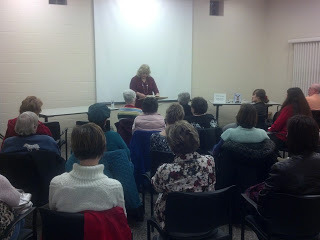



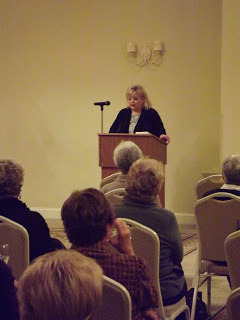
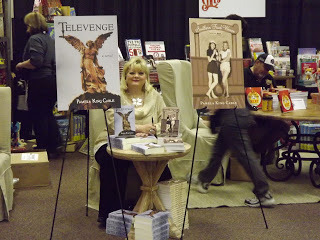
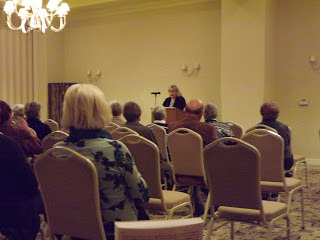

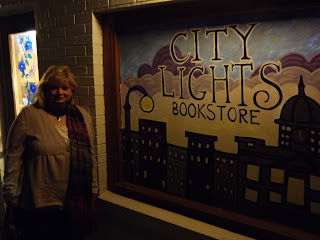

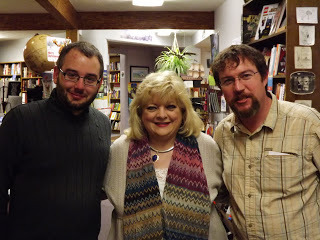


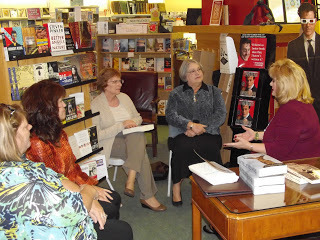

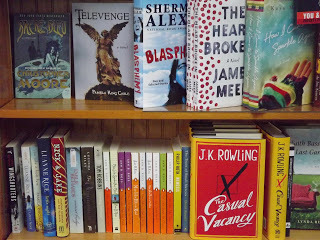

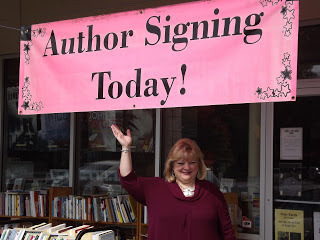
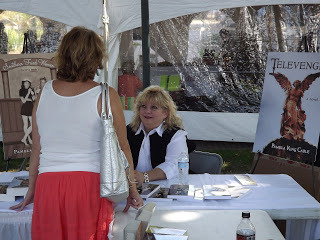



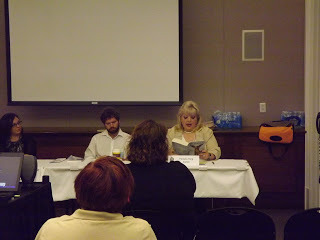
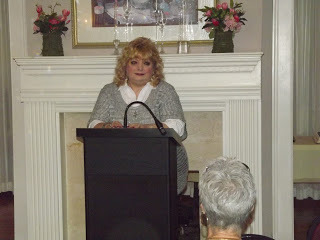
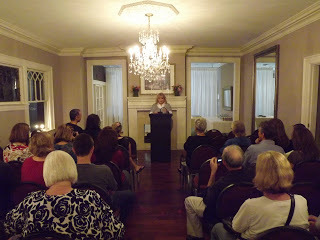
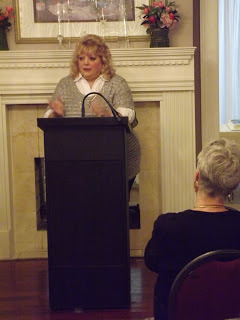
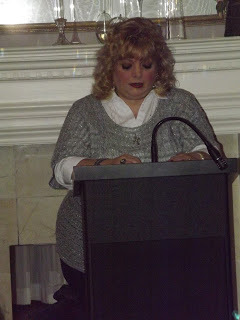




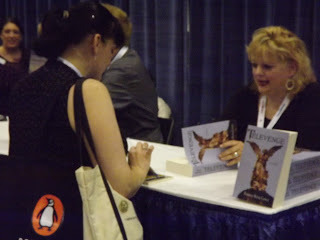
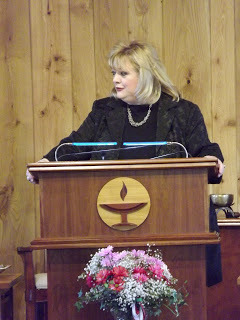
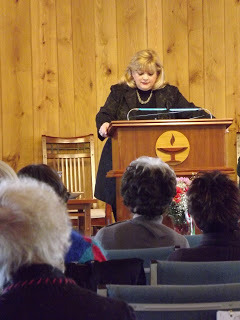
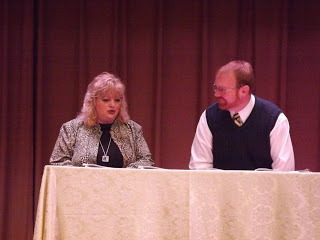
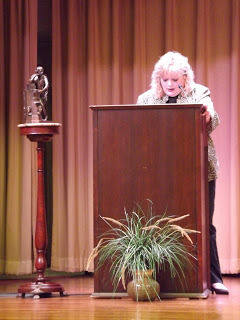
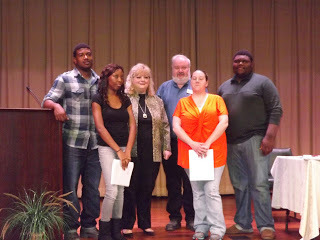


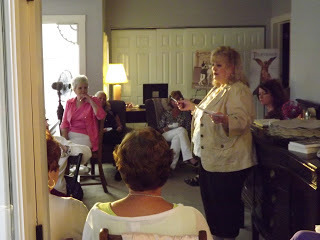
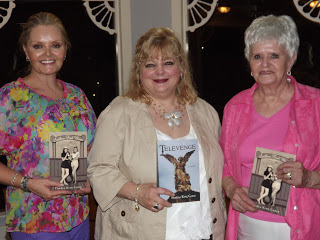
Thank you all ... the best is yet to come ...










































Thank you all ... the best is yet to come ...
Published on April 20, 2013 11:27
April 9, 2013
Brother, Can You Spare A Blurb?

Authors! Listen up..
If you are ever asked to blurb another writer’s book, I want
you to look back and remember your own path …
That author who contacted you obviously believed your name
and your words would help the success of their book. They contacted you for a
reason. It’s an honor and not to be taken lightly. So when I hear of authors
ignoring other writer’s request for a blurb, it makes my blood boil.
You may be busier than a one-armed paperhanger with no time
to read even a few sentences of another writer’s work. That’s fine.
Understandable. I get it. I’ve been there. But you take the time to return the
email, letter, phone call, or facebook message, and give that writer the
courtesy of two minutes of your time. Simply explain why you cannot write a blurb at this time. Easy. Two minutes.
It seems to me, if you’ve been blessed enough to have made it to the top, it's your obligation to turn around, offer your hand, and lift somebody up. It
may only be a word of encouragement, but the least you do is offer a heartfelt
apology for not being able to read the writer’s work. Their work that that
contains the same blood, sweat, and tears that you’ve put into your own work.
Never forget; never forget where you came from, who you are,
and the humble spirit you must hold to your heart; a humble spirit to see you
throughout your success as a writer. For if you ever lose your humble spirit,
then you have no right to complain if the "hand of God" lifts.
There is nothing ruder in this business, nothing more tragic
and full of narcissism, than when a writer ignores the direct message, email,
or letter from another writer. True, computers crash, emails get lost, people
get sick … but when weeks have passed and all of sudden you realize you’ve got
an email or message from another author, answer it. There’s no excuse. Kindness
changes everything.
I’ve received warm and caring responses, both positive and
negative, from NY Times Bestselling authors, as well as other wonderful
authors. I’ve also been ignored by some big names in the industry, and
strangely enough, some not so big names. I can tell you in all honesty, for
those who couldn’t give me the courtesy of return email or facebook message, I will probably not buy
another one of their books or invest any further time in reading their blog or
facebook posts. But that’s just me. I would never name them, never
defame another writer. I leave them to their own conscience.
But those who wrote or called back, regardless of their
answer, I immediately fell in love with them, if I wasn’t already. It
was the fact that they cared enough to return my email or facebook message. Two minutes. That’s all
it took. Two minutes out of their day. For those two minutes they freely gave
me, I will continue to read and recommend their work. And I can tell you; I’m
not the only writer who feels this way. Writers are ALSO consumers. Never forget that.
Isn’t it the decent thing to do? Isn’t a kind reputation
worth two minutes of your time?
We are never that good, never that big, that we have the
right to be unkind, uncaring, and plain disrespectful to other writers.
Think about it.
Published on April 09, 2013 16:47
April 1, 2013
NOW WHO’S THE FOOL? TIME FOR WRITERS TO GET REAL – Tough love for today’s writer

Literary agents once ruled the world and the publishers were their Gods.
Now, it’s not the case. They’re all in a panic.
Make no mistake, they, as well as writers chasing after that
brass ring, prefer to think of self-published books as vanity publishing.
Too bad, so sad. Whether they like it or not, that is no longer the truth. I heard someone say recently that it’s a classic
example of The Emperor Has No Clothes.
Wake up, Mahogany Row. Sit up and take notice, Bestselling
Wannabes. The old dream is just about gone. Unless you’re one of the few
debut writers who break out every year, gone are the days of six-figure
advances and publishers who care about a new writer’s career. Writers pursuing
a traditional publishing contract with one of the Big 6 are like office workers
playing the lottery every week. Not good odds.
And I’ll say something here that everybody thinks and nobody says. At least
not out loud. If you are one of the chosen few of the Big 6, it doesn’t mean
you write better than the thousands who self-publish. Not anymore. Not by a
long shot. Break-out writers are no longer just those with traditional publishing contracts! Can I hear an amen?

Every year, fewer writers are sending query letters to a long list of
literary agents, only to wait up to a year or more for a response, of any kind.
Yes, no, maybe, kiss my butt … something. Gone are the days when writers have
to kowtow to literary agents and editors who snub, ignore, and reject quality
work because their ace in the hole has come out with a fifth or fifteenth book
in a series.
I’ve been writing professionally, full time, since 2003. I’m not a newbie.
Not to this business. I studied creative writing at Kent State, graduated from
the Breakout Novel Intensive with Donald Maass in 2005, and attended and/or
taught at over 25 writing conferences from New York to Florida. I’ve traveled
on my own dime since 2006, speaking and selling my books at bookstores, book clubs, women’s
groups, churches, civic groups, country clubs, and out of the trunk of my car. Over 200 venues. I've done the PR parade from TV to radio to sitting for hours at bookstores and book fairs.
Prior to signing a traditional contract with an independent small publisher
in December 2011, I chased the dream of a contract with a major publisher. It
was October 2010 and I decided to snail mail and email query letters to
approximately 106 literary agents. I wasn’t stupid about it. I researched those
who represented my genre, studied every one of their websites, and sent a
beautifully written query letter I had spent months preparing.
Sixty-one agents never acknowledged my existence. 61! The remaining asked for
partials, fulls, or rejected me entirely. I made notes of who rejected me with their
horrible form letters, or were rude, or cold, or took more than two years to
even contact me at all! Funny how writers must follow the rules, but those same
rules don’t work both ways. I made notes of the agents who were kind, rejecting
me nicely, and those who were not kind, making me feel like poop. If you’re a
writer, I’d be happy to send you the full list. It's quite interesting.
Somehow, it all made me feel so subhuman. After a while, we decided there
had to be a better way.
Eventually, I signed a year contract with a New York agent, a good one.
Sadly, nothing happened. He couldn’t sell the novel. The publisher's rejections simply blew me and my agent away. Oh yes, I kept all 20 rejections from every
New York publishing house who responded. My agent sent me their emails. They
were over the top with wonderful compliments, but the reasons for rejection
were so unsound, so ridiculous … well, at the risk of sounding like a
“typically rejected author,” I’ll stop.
I suppose there comes a time when every writer draws a line. Reaches their
limit. Sadly, in the past the only option a writer had was to collect those
years of rejection letters, or simply give up. And a lot of them did.
Thankfully, self-publishing and self promotion has become a viable option.
But like the sheep and the goats, writers will continued to be separated between
those who will pay for quality editing, professional book covers, and
publicity, and those who won’t. Writers, you can’t publish a lot of crap,
stories full of errors, because you’re in a hurry to make a million bucks. Otherwise,
we will look like those old vanity writers who never honed or polished their
writing skills in the first place. And lately it appears as though some
writers are turning out mistake-filled prose covered up by great
marketing efforts, tons of social media promotion, and a local following making them
radio stars, Toastmaster speakers, and highly promotable authors of bad books.
Book buyer beware!
Some in this business have gone so far as to say that publishers and
literary agents are a dying breed, they just haven’t laid down yet. They say we
are in a new world groping our way forward, but that life is too short to make a
deal with a dinosaur who allows retailers to return unsold books to publishers.
Many believe that antiquated process has got to stop. Everything has to
evolve, or die out and the publishing industry is no exception.
Plenty of hurdles remain for the writer, and not every writer will clear
them. But finally, we have more than one respected publishing option. A way to get paid
every month instead of once or twice a year. Don’t plan on getting rich, but
thank God, we’re no longer in Egypt. We crossed the Red Sea, and made it
through 40 years in the desert. There’s more to be done, but the ball is now in
our court.
I feel the industry will survive but will look very different to how it did
before e-readers. Prepare for a bumpy ride, writers. This venture has just
begun. Time to adjust to the current reality. Like Goodreads and Amazon. They don't
care if you've written one book or fifty. They simply push, publish, or sell books. What a novel idea!
Published on April 01, 2013 14:34
March 31, 2013
Rebuilding (Rethinking) The Meaning Of Easter

Yesterday, on Facebook, I wrote about Easter this way:
Remembering those Easters of my sisters and me, complete with scratchy new hats with chin straps, ruffled socks, red-patent leather shoes and matching purses, crinolines and petticoats, spit curls and wave-set, wishing for chocolate bunnies instead of real eggs, white chocolate crosses, white leather New Testaments, and my mother totally worn out by the time we got to church. Good times.

And then, I remembered other Easter seasons that went more like this:
Of course, in later years Good Friday services droned on for six hours (seriously, six hours) while the choir stood the entire service. (No joke.) Our candlelit holy communions were filled with "angels" and "demons" walking the aisles, and a screaming pastor. Or a pastor who made us all stand or sit in complete and utter silence because the "Spirit" was moving. "No going out, no coming in!" And we dare not move. A jam-packed sanctuary of sweaty bodies; standing room only. The place was so hot. All I could think about was having to pee, and sneaking past the gestapo ushers to use the restroom. We were prisoners in our own church.

We passed the grape juice and wafers wishing it were a cold Coke and bite of pizza. We had no real concept of the truth, or at least we couldn't think about it because of the constant manipulation and the big King James Bible he held over our heads. The sobbing and guilt and weeping and wailing and gnashing of teeth. Yeah. Not good memories of Easter. Not for me. Thank God a million times, thank God that's over. The real meaning of Easter now lives within me ...
It has occurred to me as I sit here on Easter, listening to the epic movie King of Kings on my TV, that church for us was always like that movie. Aways a show. Always an epic production. He was a master showman, a wanna-be movie star, a great actor. A man who had narsisistic view of himself, and a wild fascination for attention and the stage. And we were stupid enough to give him a standing ovation every time he pranced onto the platform at the beginning of the service. I wish we knew then the Charlatan that raged within him.
I don't think I can listen to this movie any longer. As beautiful as the story is, it reminds me too much of sitting in that church, hoping to find the true God, only to experience the oppression of a mad man. Too many times I remember running to my car, and bawling my eyes out.

Once or twice a year he would rent one of these films, King of Kings, The Greatest Story Ever Told, The Ten Commandments, and show them on the big screen that pulled down in front of the baptistery. (The show was free, of course--but there was no popcorn.) And now as I listen to the movie once again, the script haunts me. It sounds as though he wrote it. Or as if he studied these films to learn how preach, how to speak like Charlton Heston or direct like Cecil B. Demille, insuring we "trust and obey," how to use the scriptures in these films to control and manipulate.
Strange how something that should bless me, is creeping me out.
Time to turn off the TV, and read the Easter story for myself.
I pray God bless you on this Christian holiday. Because if you have read this and cannot relate to a word of it ... then He has surely blessed you already.

Published on March 31, 2013 10:38
March 18, 2013
Where Do Story Ideas Come From?

Late in 2008 I needed a break from what I was currently working on, so for the next two years I labored on a new story. I began writing The Sanctum . Once finished, I briefly tried to sell it, but then put it away. Suddenly, Televenge needed my full attention. I had signed a contract with my publisher in 2011 and the ball was rolling to put Televenge on the map. Well. We're still in the midst of traveling, speaking, and putting Televenge into the laps of our readers. It's doing well, thank you very much. One thing we know, the book promotion process is a marathon, not a sprint. But like a ghost in the closet, The Sanctum has been calling my name. To the point it has woke from a sound sleep on more than one occasion lately.
Although the above picture is not the official book cover, it represents my antagonist, Neeley McPhearson. Yesterday, someone asked me how I came up with the idea for this story, and so I thought I'd blog about it today.
Many of my stories are based on people I’ve known and places
I’ve been. History also plays a great part in my work. As a writer it is my
desire to transport a reader’s mind—but my deepest passion is to pierce your heart. As a little girl, my
father told me in all sincerity that I was related to the great Martin Luther
King, since after all, my maiden name is King. He taught me respect for all people. But I soon discovered
blatant prejudice in other branches of my family. My southern grandparents
believed wholeheartedly in segregation.
Working for nearly ten years on Televenge , I needed to go in another direction on a new story. I knew I wanted to write a novel that included the possibility of the paranormal and spirituality from different points of view. I began a
story focused on a young girl with fuzzy red hair who wore thick eyeglasses.
(I have a niece with red hair, whom I dearly love.)
For a while all I saw was an image of Neeley, a skinny, lonely, parentless girl
who lived on a tobacco farm. Placing my little redheaded white girl in the
caring hands of a seventy-year-old African-American male, a rugged individual
who wasn’t afraid of his gentle side, I quickly fell in love with them, and the
novel slowly wrote itself.
For over ten years, I lived near
Summerfield, North Carolina, located northwest of Greensboro. This area is historically saturated with
horse and tobacco farms, which today still dot the landscape. By chance I
discovered James W. Cole (1924-1967) was ordained into the ministry in
Summerfield at the Wayside Baptist Church in 1958. He toured as a tent
evangelist and broadcast a Sunday morning radio program, becoming an active
member of the Knights of the Ku Klux Klan, and eventually the Grand Dragon of
North and South Carolina. The man intrigued and appalled me, and since the
first third of The Sanctum takes place in Summerfield during that time
period, I decided to write him into the story.
The International
Civil Rights Center and Museum is located in the recently restored Woolworth’s
building in downtown Greensboro, a Woolworth’s that also found its way into my
story. As I further studied the civil rights movement, I thought of it in terms
of rights for all people. My great grandmother was a full-blooded Cherokee,
according to my father, our family’s historian. So I then researched the
Trail of Tears.
And finally the
wolf appeared. An animal that has fascinated me all my life, the wolf is about
family and order. It is a subtle character, but a voice to be reckoned with. I
studied wolves carefully, and found people who loved the animal enough to
create sanctuaries for them. I spent time on a wolf sanctuary near the town of
Bakersville in the Blue Ridge Mountains, a five-hour drive from my home. When I
arrived, I saw a sign that read The
Wolf Sanctum. From that moment, I
called my novel The Sanctum .

Ideas for your stories can be gathered from many sources, but my suggestion is to dig deep within your own family history. There is a movement today that says, "write what you don't know." While that is admirable, causing you many months of research, writing what you do know about, I find, lends to a richer tale. In short, they're stories you CARE about. Although, research is needed with every book you write, it's what you've experienced and how you show it on the page that remains with the reader. And that, my friend, is my ultimate goal.
The Sanctum will be launched in April, available as an e-book, and also in trade paperback. Stay tuned ... I'll be blogging more on this process ... and offering excerpts.
Blessings to you and yours.
Published on March 18, 2013 10:33
March 11, 2013
What do Scientologists and Evangelicals have in Common?

A few weeks ago, Rock Center, a news show with Brian
Williams and Harry Smith, reported on Scientology. Their show, The Defectors,
aired the same day Lawrence Wright (a Pulitzer Prize winner) launched his new
book, Going Clear, Scientology, Hollywood, and the Prison of Belief.
This book, based on Wright’s investigation of Scientology,
included his interviews of more than 200 people, mostly former church members.
Wright called them bright and interesting people, not freakish crackpots, but
that while the religion has been a positive experience for some; it has long
been shadowed by allegations that many have been emotionally and physically
abused.
The shock of the interview was not as great as the shock
of similarity between the Church of Scientology and the megachurch, the
evangelical church from which I defected.
Harry Smith interviewed Paul Haggis, Oscar-winning writer
and director of the film, Crash. Haggis is said to be the highest-ranking
Scientologist to ever leave the church and speak out publicly.
The alleged horrors described in Smith’s interview may not
be to the degree I experienced in the evangelical church, but certainly the
resemblance is a strong one.
Haggis mentioned that allowing himself to be interviewed was
insanity. Speaking freely, he also said it was incredibly stupid to speak out
against Scientology, but that he has been ashamed of his stupidity and had been
purposely blind for years. According to Haggis, everyone who has left
Scientology has left quietly. But not Haggis. He decided to leave loudly.
For me, writing a novel about the dark side of
televangelism may also be considered as a mark of insanity. Although fiction,
Televenge was definitely inspired by my own experiences. The fact that my
family was torn apart by the edicts of a pastor cannot go away, no matter the
passing of time.
Now shunned by the church, Haggis says Scientology is a
therapy session, with lots of one-on-one counseling. That it’s a long, slow
walk toward believing.
Shunning is something you live with when leaving these
congregations, evangelical or otherwise. For many evangelicals, the long, slow
walk toward salvation starts the moment we enter our first Sunday school class.
Says Haggis, “If it (Scientology) hadn’t helped me, then it
never would have got a hold of me.”
Many in evangelical churches claim to have experienced the
miracle power of God. I believe God honors faith wherever he finds it. Our
megachurhes are filled with good, hard-working, honest folk. The church was
once the lifeblood of my existence for over twenty years. Leaving is not an
easy decision but it becomes the only one you can make when you no longer wish
to be controlled by the man in the pulpit.
“The idea of being part of a group that’s ostracized and
hated, bands you together against the outside world,” Haggis said. Later, he
says he learned of abuse at the highest levels of the church.
Of course, the Church of Scientology denies it all.

In large evangelical churches, the outer circle consists
of honest folk unaware of the goings-on within the ministry. The inner circle
(ministry team, choir, musicians, ushers, office and technical staff) knows the
ministry’s secret sins. Even the indiscretions of pastors who preach against
the homosexual lifestyle they practice. Of course, not all evangelical churches
fit this mold. But it is this writer’s experience the corruption inside many
televised megachurches may rival that of the Church of Scientology.
Because many
call themselves Christians – members of a religion with a respectable position
in society, they do not hesitate to condemn Scientology or Mormonism. The truth
is, we’re so busy looking for the splinter in the eyes of others we can’t see
the log in our own. Confusing the fiercness to protect God’s word with
arrogance and pride, Christians often become worse than those they condemn.
According to Haggis and Wright, Scientologists were
vindictive and litigious, spying on people and creating an atmosphere of fear.
“They’re not people you want to mess with,” Haggis said.
As evangelicals, we had first class tickets to heaven. Our
membership existed in fear. Fear of Hell, fear of the devil, fear of missing
the rapture, constant fear of God’s everlasting wrath, and of disappointing our
pastor. It was an unwritten sin to miss church, to question the pastor’s
authority, or even walk out during a service.
Haggis indicated Scientologists believe the body is host to
space aliens invading and infesting us by the hundreds, causing all kinds of
physical and mental problems.
We evangelicals believe the same thing, only we call those
space aliens—demons.
Finally, Harry Smith asked, “Why did you stay?”
To which Haggis answered, “It’s part of your life at that
point. Your kids, friends, wife, they’re all there. It’s what you know.”
It’s the same for evangelicals. We also stayed because it
was branded into us that leaving our church meant never amounting to anything
for God; that we would die and lift up our eyes in Hell. Those were his exact
words, over and over, burned into my memory.

Harry Smith then asked, “Is it a cult?”
“Of course it is,” said Haggis. “It’s your system of belief.
You’ve got these folks inside this fortress who won’t look out. Won’t look at
any criticism and can’t bear any investigation and think the outside world is
against them. Yes, it’s a cult.”
Many evangelicals don’t dance or listen to music other
than what is produced in their church. We didn’t smoke or drink; we were
sheltered from the world and its sins. Our children were discouraged from
participating in high school sports as it interfered with church attendance.
Our lives existed from one four-hour service to the next. Hanging on every
word, movement, and gesture of a man who claimed that since his salvation he
lived without sin, we believed in his confession of perfection. We had no
deacons or board of elders, and belonged to no denomination. He answered to no
one, and didn’t tolerate those who questioned him. But when we pulled away, the
losses we suffered were no less than unbearable.
Haggis said leaving the Church of Scientology was an act of
treason.
In my former church, to associate with anyone who defected
is also treason. Those of us who left have been shunned for years. People we
knew and grew up with ignore us in public. We’ve been stopped at the door of
funerals and not permitted to enter. Even funerals of family members.
Wright says because the Church of Scientology is protected
under the first amendment, it allows the church to build capital and power.
Power the church has exploited. He says the church abuses its members by
shaking them down for money, heaping vengeance on those who disagree, punishing
critics, and holding people against their will inside the highest levels of the
church.
Televangelism is a billion-dollar business. Scared
religion and the prosperity doctrine keep us giving endless love offerings we
can’t afford and paying tithes instead of bills. Some evangelical pastors have
an amazing ability to make sure we give our last dime. Declaring us
demon-possessed should we speak out against them, they build invisible walls,
and hold us captive by convincing our family or our spouses that Hell awaits
them should they defect with us.
The Church of Scientology says there is no credibility to
Wright’s statements and that all complaints come from malcontentment. But
Wright says there are too many collaborated stories from people who got out.
Stories, it seems to me, he could not ignore.
And then, when you think it can’t get any worse, Harry Smith
introduced Hayden and Lucy James, former Scientologists who got out with their
immediate family in tact. But the James family worked for Sea Org, part of the
church. They had signed a contract to work a billion years for Scientology. The
problems came when they wanted to have a baby. Lucy became pregnant and was
pressured to have an abortion. But they resisted and their daughter, Katrina,
was born.
As part of the inner circle of our evangelical megachurch,
we were highly discouraged from having children. Children meant less time and
money you could give to the church, besides, Jesus was coming back soon; it was
not the time to bring children into the world. Many young men were counseled to
have vasectomies, and some women were strongly encouraged to have an abortion.
But before the James family could break out of Scientology,
they were held in a windowless basement and prohibited from seeing their own
daughter. Separated, interrogated for weeks, and placed under guard, the James
family said this happens to many families who want out.
Harry Smith could hardly believe it and asked, “Why couldn’t
you all just walk out?”
Walking out of a cult is not as easy as it looks. But the
James family answered the same way I do. You don’t walk out because the
consequences of your actions will result in having your family torn apart. The
fear of what they could do to you, the intimidation, it’s overwhelming. It took
years for me to finally walk out, holding tight to my children, and never
looking back.
Hayden and Lucy James had to pay a huge bill for breaking
their contract. They were made to feel guilty for breaking that billion-year
contract and for back tithes owed.
Our extremely low wages did not cover the untold years of
volunteer time my ex-husband gave to the church. There were no contracts to
sign. They hold Hell over your head instead. I had sacrificed my husband and
the better part of my youth to a pastor and his mega ministry. I had nothing
left to give.
The James family remains disconnected from family members
inside the church. They can’t speak to them or call them, and indicate those
within Scientologist circles are aware this is what happens when you defect,
which keeps everyone quiet.
I’ve met and interviewed over a hundred people who
defected from all types of controlling ministries across the country. The
common thread of suffering great losses weaves itself through all of our
experiences. In some instances, the church was nothing less than a Mafia of
holy men, with unexplained deaths, the horrors of shunning and manipulation,
and the opulence of televangelism.
The Church of Scientology denies allegations by those like
Paul Haggis and Lawrence Wright, and it seems some folks can list a number of
good things Scientologists do and have done in today’s society. But the fact
remains that the Haggis family and the James family, as well as many others have
been victimized.
I contend that acceptance, tolerance, and forgiveness
preached by many of the dogmatic evangelical churches are non-evident due to the
hundreds of families it has destroyed.

An article, dated February 7,
2013 by Kyle Buchanan entitled, What You Need to Know About The New Yorker’s
Paul Haggis—Scientology Article, quotes Haggis as saying, “These people
have long memories. My bet is that, within two years, you’re going to read
something about me in a scandal that looks like it has nothing to do with the
church.”
I hope you’re wrong this
time, Paul. I hope you’re wrong.
Published on March 11, 2013 13:03
Pamela King Cable's Blog
- Pamela King Cable's profile
- 54 followers
Pamela King Cable isn't a Goodreads Author
(yet),
but they
do have a blog,
so here are some recent posts imported from
their feed.



